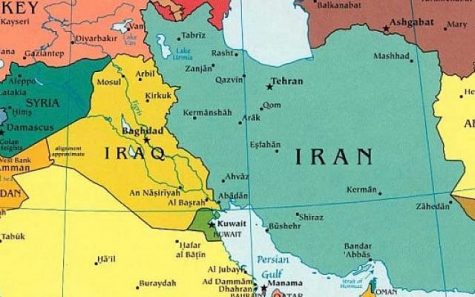OUTSIDE THE PREP BUBBLE: Tensions flare between US, Iran, and Iraq
From Issue 6
 “Outside the Prep Bubble” is a recurring column discussing an important current event each month that affects not only Jackson, Mississippi but the rest of the United States and the world. The purpose of this column is to expose students to events occurring outside of Jackson Prep and explain the importance of these events.
“Outside the Prep Bubble” is a recurring column discussing an important current event each month that affects not only Jackson, Mississippi but the rest of the United States and the world. The purpose of this column is to expose students to events occurring outside of Jackson Prep and explain the importance of these events.
January 2, 2020: not yet a week into the new decade, and the United States has committed a military act that could result in a serious escalation of tensions for foreign relations with several Middle Eastern countries, primarily Iran and Iraq. Outside of an airport in Baghdad, Iraq, Major General Qassim Soleimani of Iran was killed by a United States drone strike. Prior to the strike that killed Soleimani, President Donald J. Trump had ordered several airstrikes in other regions of Iraq and Syria targeting members of the Kataib Hezbollah militia group, whose attacks on a military base killed one American and wounded several others. Supporters of Hezbollah also stormed the American embassy in Baghdad. Following these attacks, Trump stated that Iran would be held fully responsible for any further actions against Americans.
The White House claims that Soleimani has been the brains behind many operations and attacks against Americans over the past twenty years, and President Donald Trump stated that the airstrike was ordered because Soleimani was “plotting imminent and sinister attacks” against American citizens living in the Middle East. The airstrike was executed without Congressional approval, legal under U.S. law because the White House made it clear the attack prevented an imminent threat to Americans.
Shortly following the airstrike, Iran launched over two dozen ballistic missiles at two Iraqi military bases housing American troops. Iranian Foreign Minister Mohammad Javad

later stated that Iran “does not seek escalation of war” with the United States, a statement seemingly at odds with Iran’s antagonist military actions and Iranian officials’ declaration that the attacks were in retaliation for the killing of Soleimani.
Many of Iraq’s citizens worry that the escalating tensions and actions between the United States and Iran could bleed over into their country, a concern supported by the Iranian strikes on Iraqi bases stationing U.S. troops. With Soleimani’s death could come a deterioration of cooperative relations between the United States and Iraq, as Iraqi officials consider pushing the nearly 5,000 American troops stationed in Iraq out of the country.
On January 11, a Ukranian passenger airliner was struck by an Iranian surface-to-air missile minutes after taking off from Tehran, Iran. For several days the Iranian military maintained that the plane went down to human error—“Human error at a time of crisis caused by US adventurism led to disaster,” stated Foreign Minister Zarif—before finally admitting that the Boeing 737-800 had indeed been hit by one of their missiles. Iranians flooded the streets to protest their government’s actions. Though the plane was hit by an Iranian missile, the Iranian military still maintains that the tragedy was an accident, a result of the plane supposedly making a turn toward a sensitive military base. However, later an Iranian official would state that “the plane was flying in its normal direction.” Iran continues to blame the escalating tensions and paranoia resulting from the United States’s airstrike on Soleimani for the mistake, a mistake that resulted in the death of all 176 passengers on board the plane.
Most recently, on Monday, January 27, a U.S. Bombardier E-11A aircraft crashed in the Ghazni province of eastern Afghanistan. Currently conflicting reports surround the incident—U.S. officials claim the crash was a result of a mechanical malfunction while a spokesman for the Taliban claims the group shot down the plane, a claim the U.S. has continued to refute—adding further uncertainty to the rapidly escalating tensions between the United States and the Middle East.
As a result of the killing of Soleimani and subsequent events, rumors of “World War Three” have made their rounds on the internet. While it cannot be denied that the actions of the United States and Iran have escalated in the region, it is unlikely that Congress would officially declare war and another world war break out. Furthermore, it even less likely that Congress would implement a draft as many younger citizens have joked. Despite the memes and jokes, the topic’s prevalence indicates the concern of America’s younger population about the future of the country’s foreign relations, a well-founded concern considering the many airstrikes and threats that have occurred in only the first month of the new year.







